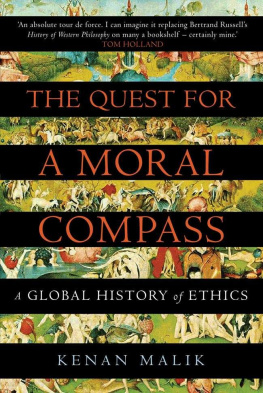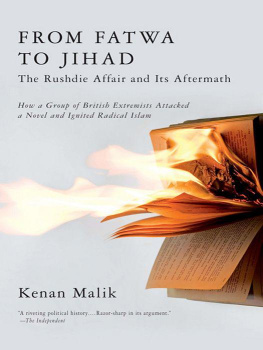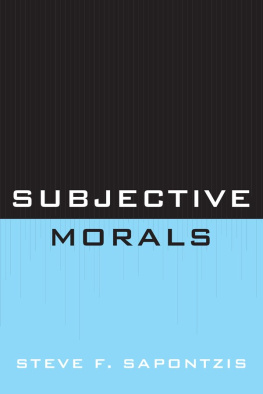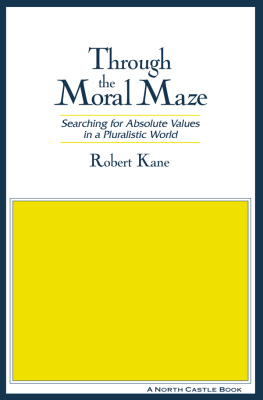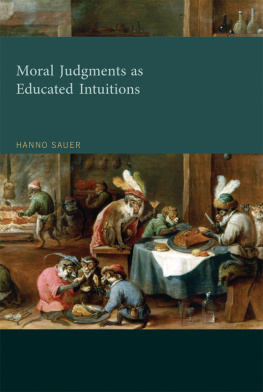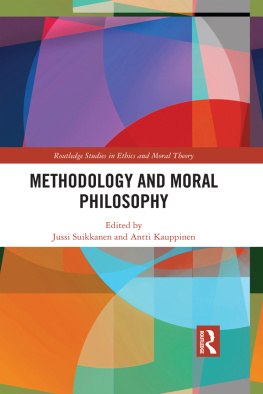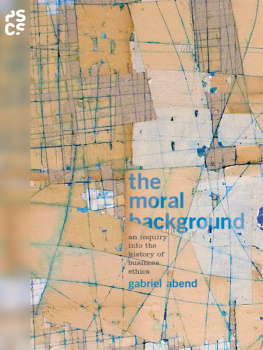THE QUEST FOR A MORAL COMPASS
Also by Kenan Malik
From Fatwa to Jihad
Strange Fruit: Why Both Sides are Wrong in the Race Debate
Man, Beast and Zombie
The Meaning of Race


First published in hardback in Great Britain in 2014 by Atlantic Books Ltd.
Copyright Kenan Malik, 2014
The moral right of Kenan Malik to be identified as the author of this work has been asserted by him in accordance with the Copyright, Designs and Patents Act of 1988.
All rights reserved. No part of this publication may be reproduced, stored in a retrieval system, or transmitted in any form or by any means, electronic, mechanical, photocopying, recording, or otherwise, without the prior permission of both the copyright owner and the above publisher of this book.
The author and publisher would like to thank the following for permission to reproduce copyright material: Extract from Little Gidding from Four Quartets by T. S. Eliot Estate of T. S. Eliot and reprinted by permission of Faber and Faber Ltd; Extract from Translation by Roy Fuller from Selected Poems (2012) used by permission of Carcanet Press Limited.
Every effort has been made to trace or contact all copyright-holders. The publishers will be pleased to make good any omissions or rectify any mistakes brought to their attention at the earliest opportunity.
10 9 8 7 6 5 4 3 2 1
A CIP catalogue record for this book is available from the British Library.
Hardback ISBN: 978-1-84887-479-4
Trade paperback ISBN: 978-1-84887-480-0
E-book ISBN: 978-1-78239-0-305
Paperback ISBN: 978-1-84887-481-7
Printed in Great Britain.
Atlantic Books Ltd
An imprint of Atlantic Books Ltd
Ormond House
2627 Boswell Street
London
WC1N 3JZ
www.atlantic-books.co.uk
For Maya,
the most moral person I know
(though who will, no doubt, disagree with most of this),
and for Carmen,
whose moral sense already puts mine to shame
Contents
CHAPTER ONE
On the capriciousness of gods and the tragedy of Man
Sing, goddess, of the anger of Achilleus, son of Peleus, the accursed anger which brought uncounted anguish on the Achaians and hurled down to Hades many mighty souls of heroes, making their bodies the prey to dogs and the birds feasting; and this was the working of Zeus will. Sing from the time of the first quarrel which divided Atreus son, the lord of men, and godlike Achilleus.
So opens the most celebrated work of Greek poetry, the earliest expression of European literature, and, to some, its greatest too. Homers Iliad tells the story of the Trojan War, the ten-year struggle by Achaean Greeks to avenge the abduction of Helen, wife of Menelaus, the king of Sparta, by Paris, son of the Trojan king Priam. (The Achaeans were the first Greek-speaking inhabitants of what we now call Greece.) The Iliad forms one half of a poetic diptych with the Odyssey , in which Homer recounts the tale of Odysseus struggle to return home after the fall of Troy, a struggle that was to last as long as the war itself.
Written in the eighth century BCE , the Iliad and the Odyssey are distilled from a long and rich tradition of oral poetry, the work of generations of illiterate singers in an illiterate age who composed and passed on their epics of men and gods, love and death, adventures and conquests, without the aid of writing. Over centuries these tales melded together into a stock of myths that gave the audience that listened to the itinerant poets a sense of time and place. The Homeric poems were both the culmination of this tradition and its transformation, works that drew upon the oral lore but whose depth of vision, breadth of imagination, and sheer ambition gave voice to a new kind of literature and to a new kind of myth. The Iliad and the Odyssey gave ancient Greeks a sense of their history, turned a fable about their origins into the foundation stone of their culture, nourished generations of poets and sculptors and artists and established a framework for their moral lives. It is a good place from which to embark on our journey of exploration through the history of moral thought.
The Iliad is a poem about the Trojan War. And yet it is not a poem about the Trojan War. The beginnings of the conflict and the sacking of Troy both lie offpage. The whole story of the Iliad is contained within a span of fifty-two days in the tenth and final year of the war. The main action, running through twenty-two of the poems twenty-four books, occupies just four days.
The quarrel of which Homer speaks in the opening line of the Iliad is not the quarrel between the Greeks and the Trojans, but that between Agamemnon, the leader of the Greek forces, and Achilles, son of the goddess Thetis and the most famous of the Greek warriors. Homer begins his tale by telling of how Chryses, priest to the god Apollo, asks Agamemnon to allow him to ransom his daughter Chryseis whom the Achaean king had captured as a war trophy and claimed as a slave. When Agamemnon rudely rejects him, Chryses prays to Apollo for help. Apollo sends a plague upon the Greeks. To pacify the god, an assembly of Greek warriors demands that Agamemnon return his slave girl to Chryses. Agamemnon agrees, but only if he be given, in exchange, Achilles concubine, Briseis, another prize captured in war. Humiliated and dishonoured, Achilles withdraws himself and his warriors from the conflict.
Agamemnons wicked arrogance and the ruinous wrath of Achilles provide the raw material for Homer. His theme is not the war but the tragedy of the human condition, the unintended consequences of human sentiment and the nature of fate in governing human life. All the major dramatic moments of the poem spring fatefully and inevitably from the quarrel between Achilles and Agamemnon. With Achilles out of the battle, Hector, brother of Paris, successfully breaches the Greek camp, with backing from the gods. Achilles closest friend, Patroclus, who had also withdrawn from the war, re-enters the fray, dressed in Achilles armour. He manages to repel the Trojans but is killed in battle by Hector. In revenge, a distraught Achilles defeats Hector in single combat, then defiles his corpse for days, until King Priam persuades him to give up the body. The Iliad ends with Hectors funeral. The death of Achilles and the fall of Troy lie outside the narrative of the poem. But we know that both will happen, for they are as inevitable as were the deaths of Patroclus and Hector, two more moments in the unbroken sequence that had sprung from Achilles anger.
And so the plan of Zeus was fulfilled, Homer writes of the consequences of Achilles wrath. Achilles accursed anger had set forth a train of events that had brought uncounted anguish on the Achaeans and hurled down to Hades many mighty souls of heroes. But both that anger and that train of events were also part of a divine plan. Throughout the Iliad , divine and human causation are inextricably linked. Achilles and Agamemnon are responsible for their actions. They and not just they have to pay the price for their pride, arrogance and folly. And yet their actions are shaped by the gods, and their fates decided by Zeus scales.
The drama on the battlefield is shadowed by the drama on Mount Olympus. We see the gods holding council, quarrelling and sulking, laughing and partying and making love, and descending from their Olympian heights to change the course of human affairs. When Achilles is dishonoured by Agamemnon, his distraught mother, the goddess Thetis, appeals to Zeus, who promises her major Trojan success so as to bring honour to Achilles. As Paris is about to be defeated by Menelaus in a duel he has foolishly called, Aphrodite snatched him away with the ease of a god, wrapped him in thick mist, and set him down in his sweetly-scented bedroom. When Hera, the wife of Zeus, who has championed the Achaeans, protests about her husbands support for the Trojans, he accepts that she can have her way and see Troy sacked but also issues a warning: Whenever I in my turn am eager to destroy a city peopled by men who are dear to you, do not try to thwart my anger, but let me have my way.
Next page
